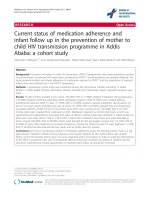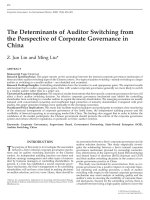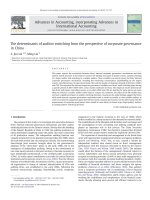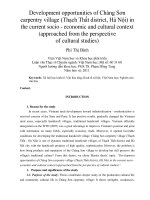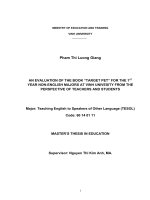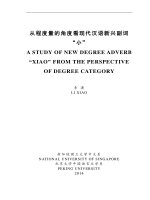The perspective of older war veterans of italo abyssinian war of 1935 41, on the nature of care they receive in addis ababa, ethiopia
Bạn đang xem bản rút gọn của tài liệu. Xem và tải ngay bản đầy đủ của tài liệu tại đây (857.06 KB, 111 trang )
PERCSPECTIVE OF OLDER WAR VETERANS……
1
The Perspective of Older War Veterans of Italo- Abyssinian War of 1935-41, on the Nature
of Care they Receive in Addis Ababa, Ethiopia
By: Hosseana Solomon Semegen
A Thesis Submitted to the School of Graduates Studies Addis Ababa University Presented in
Partial Fulfillment of the Requirements for the Degree of Masters in Social Work (in Children,
Youth andFamily Concentration)
Addis Ababa University
Addis Ababa, Ethiopia
June 2017
PERCSPECTIVE OF OLDER WAR VETERANS……
2
The Perspective of Older War Veterans of Italo- Abyssinian War of 1935-41, on the Nature
of Care they Receive in Addis Ababa, Ethiopia
By: Hosseana Solomon Semegen
Advisor: Dr. Meseret Kasahun
A Thesis Submitted to the School of Graduates Studies Addis Ababa University Presented in
Partial Fulfillment of the Requirements for the Degree of Masters in Social Work (in Children,
Youth and Family Concentration)
Addis Ababa University
Addis Ababa, Ethiopia
June 2017
PERCSPECTIVE OF OLDER WAR VETERANS……
3
ADDIS ABABA UNIVERSITY
SCHOOL OF GRADUATE STUDIES
This is to certify that the thesis prepared by Hosseana Solomon Semegen entitled: The
Perspective of Older War Veterans of Italo- Abyssinian War of 1935-41, on the Nature of Care
they Receive in Addis Ababa, Ethiopia; submitted in partial fulfillment of the requirements for
the Degree of Master of School of Social Work (MSW) complies with regulation of the
University and meets the accepted standards with respect to the originality and quality.
Signed by the examining committee:
Dr. Meseret Kassahun
_______________
_______________
Advisor
Signature
Date
Dr. Abebe Assefa
_______________
________________
Examiner (Internal)
Dr. Hussein Jemma
Examiner (External)
Signature
_______________
Signature
Date
_______________
Date
PERCSPECTIVE OF OLDER WAR VETERANS……
4
Declaration
I, the undersigned, declare that this is my original work and has not been presented for a
degree in any other university and all the sources of materials used for the research project have
been duly acknowledged.
Student Name
Hosseana Solomon
Signature
………………………..
Date
………………………….
Advisor Name
Dr. Meseret Kassahun
………………………….
……………………..
PERCSPECTIVE OF OLDER WAR VETERANS……
i
Acknowledgements
My deepest gratitude is to my God, all I have accomplished is because of his will, so am very
much thankful.
There are many people who were always by my side supporting, encouraging and motivating
me. First thanks to my advisor, Dr. Mesert Kasshaun who have guided, advised, and patiently
assisted me to stay on course throughout the research. I am grateful to Dr. Messay G/Mariam for
his valuable comments during the proposal defense and off.
Second, I am thankful to all who participated in the study, who were so generous in their
time and share their experiences. I am also grateful to Ato Ermiyas Tessema and Ato Mamush
Admasu for helping me contact the participants
I am especially thankful to my families and friends, my mother Wubalech Adugnawho is
always supportive and encouraging, my sister Lidya Solomon who helped me in typing and
editing the paper, my best friend Sitotaw Desalegn, was inspiring, he helped me interview and
edit the paper, my friends Abiy and Mahelet who were always providing me with information
and motivation, so thank you all for being all the way with me. Last but not least a special thanks
to Almaz Semegen and Rahel Nekatibebe without them, locating the documents written on the
issues of patriots would have been extremely hard.
Even though he is not alive and here to support me the dream and motivation of my dad
Atosolomom Semegen have always been inspirational and have guided me in all of my life.
Everything I have accomplished and will achieve in future is because he believed in me therefor
am very much thankful and grateful to have had him as a father RIP.
PERCSPECTIVE OF OLDER WAR VETERANS……
ii
Abstract
The increase in older population and situations affecting elders all over the world forced
global and local stakeholders to give greater attention. Older adults in Ethiopia are vulnerable
groups of community and are being challenged socially, psychologically and economically.
Among these elders are those old war veterans who served their country during the ItaloAbyssinian war of 1935-41 G.C.; these veterans have been neglected and deprived of the at most
care or support of all stakeholders and demands attention. This study tries to understand the
attitudes of older war veterans about the nature of care they receive, the types of care available,
challenges experienced and coping mechanism employed by older war veterans. In order to get
rich information, the feeling and perception of people which cannot be understood statistically
the research employed qualitative methodology, a phenomenological study design and key
informant interview and document analysis methods with 7 older war veterans in Addis Ababa
who have participated in the Italo- Abyssinian war of 1935-41 G.C.. The finding revels older war
veterans encounter economic, social, political and health problems, in order to deal with the
different life stressors they use crying, praying, working, forgiveness, bagging and relying on
children as a coping mechanisms. More over the study came across the perception of patriots on
the care they receive to be unsatisfied and below expectation. The study findings have
implications for Social Work practice, education, for policy and research.
Key Words: - older war veterans, elders, care or support, patriots
PERCSPECTIVE OF OLDER WAR VETERANS……
Acronyms
AEP –
Association of Ethiopian Patriots
CSA –
Central Statistical Agency
E.C. –
Ethiopian Calendar
FDRE –
Federal Democratic Republic of Ethiopia
G.C. _
Gregorian calendar
HAI –
Help Age International
IPA –
Interpretative Phenomenological Analysis
IQ _
Interview Questions
MOLSA –
Ministry of Labour and Social Affairs
NASW –
National Association of Social Workers
PTSD _
Post- Traumatic Stress Disorder
UNDP –
United Nation Development Program
WHO –
World Health Organization
iii
PERCSPECTIVE OF OLDER WAR VETERANS……
Table of Contents
iv
Page
Acknowledgments…………………………………………………………………………....i
Abstract………………………………………………………………………………………..ii
Acronyms……………………………………………………………………………………..iii
1. Chapter One: Introduction
1.1
Background of the problem…………………….…………………………………1
1.2
Statement of the problem………………………………………………………….3
1.3
Research Objective ……………………………………………………………….8
1.4
Research Question………………………………………………...........................8
1.5
Significance of the study………………………………………..............................8
1.6
Scope……………………………………………………………………………..10
1.7
Organization of the thesis………………………………………………………..10
2. Chapter Two: Literature Review
2.1 Conceptual Definition ………………………………………………………………11
2.2 Condition of elders…………………………………………………………………...12
2.3 Theoretical perspectives ………..……………………………………………………13
2.3.1 Activity Theory……………………………………………………………..13
2.3.2 Continuity Theory…………………………………………………………..14
2.3.3 Social exchange theory……………………………………………………...14
2.4 Policy Documents on elders and older war veterans……………………………….15
2.4.1 UN principles for older people……………………………………………...15
2.4.2 Madrid international plan of action on aging……………………………….16
2.4.3 African Union policy framework and plan of action for elders…………….16
PERCSPECTIVE OF OLDER WAR VETERANS……
v
2.4.4 Growth and Transformation plan …………………………………………..17
2.4.5 The FDRE Constitution……………………………………………………..18
2.4.6 National plan of action on older people…………………………………….18
2. 4.7 Policy Response for older war veterans……………………………………19
2.5 Type of Care for elders……………………………………………………………….20
2.5.1 Family care giving…………………………………………………..............20
2.5.2 Institutional care for old person……………………………………………..22
2.6 Studies on Elders………………………………………………………........................23
2.6.1 Global Context……………………………………………………………...23
2.6.2 Ethiopian Context…………………………………………………………...25
2.7 Summary ……………………………………………………………………………..27
3. Chapter Three: Research Methodology
3.1 Study area ………………………………………………………………………….29
3.2 Methodology ………………………………………………………………………...29
3.3 Study design …………………………………………………………………………30
3.4 Sample size ………………………………………………………………………….32
3.5 Participants selection criteria………………………………………………………...32
3.6 Method of data collection……………………………………………………………33
3.7 Data collection procedures…………………………………………………………...34
3.8 Data analysis technique………………………………………………………………35
3.9 Trustworthiness………………………………………………………………………37
3.10 Ethical considerations ……………………………………………………………...38
4. Chapter Four: Data presentation
PERCSPECTIVE OF OLDER WAR VETERANS……
vi
4.1 Participants’ profile…………………………………………………………………..39
4.1.1 Participants’ profile in aggregated form ………………………………..39
4.1.2 Brief description of participants’ profile………………………………..47
4.2 Care for older war veterans…………………………………………………………..51
4.2.1 Care Providers…………………………………………………………..52
4.2.1.1 Formal care providers………………………………………...52
4.2.1.2 Informal care providers………………………………………57
4.2.2 Types of care……………………………………………………………60
4.2.2.1 Formal Types of care…………………………………………60
4.2.2.2 Informal Types of care ……………………………………….62
4.3 Perspective of older war veterans on the Types of care they receive ……………….64
4.4 Challenges Experienced by older war veterans ……………………………………..68
4.5 Coping Mechanism…………………………………………………………………..74
4.6 Policy Response ……………………………………………………………………..76
4.7 Summary……………………………………………………………………………..77
5. Chapter Five: Discussion
5.1 Perspectives of older war veterans…………………………………………………...79
5.2 Types of care older war veterans receive…………………………………………….80
5.3 Challenges experienced by older war veterans………………………………………81
5.4 Coping Mechanism…………………………………………………………………..82
6. Chapter Six: Conclusion and Implication to Social Work
6.1 Conclusion…………………………………………………………………………...84
6.2 Implication to Social Work…………………………………………………………..85
PERCSPECTIVE OF OLDER WAR VETERANS……
Reference
Annexes
Annex I: IQ V1 Guideline
Annex II: IQ V2 Guideline
Annex III-Informed Consent
vii
PERCSPECTIVE OF OLDER WAR VETERANS……
1
1. Chapter One: Introduction
The purpose of this chapter is to orientate the reader to the research andprovide context to
following Chapters. The chapter consist background of the problem, statement of the problem,
significance of the study, research question, research objective, rational of the study limitation,
operational definition and organization of the thesis.
1.1 Background of the problem
Ageing and the situation of older people is one of the burning issue or concerns both
globally and in sub- Saharan Africa. Currently due to the changed and changing characteristic of
the demographic trend in older people, the issue isbeing given due attention and
progressivelybeen pushed to the top of the sustainable development goal and post 2015
development policy agenda(Help Age International, 2013). The world witnessed a dramatic
increase in its total population,but it has also experienced a dramatic increase in the proportion of
the ageing population, (United Nations Development Program [UNDP], 2008).Recently out of
the total population older people account for 12 percent but people age 60 and over are projected
to reach 21percent (Help Age International [HAI], 2013). The rapid increase in older population
isparticularly observed in the developed region of the world, and the developing and least
developed regions are following suit in the coming decades with falling fertility and mortality
(CSA, 2010)
In sub- Saharan Africa, the number of older people is expected to raise from 37.1 million
in 2005 to 155.4 million in 2050, rapid increases for any other age group (UNDP, 2008). The
increase in ageing population will have far- reaching effect on the socioeconomic and political
lives of elders and likely increase their vulnerability (HAI,2013) and World Health Organization
(World Health Organization [WHO] 2005 AND 2006) identified increase in ageing population
PERCSPECTIVE OF OLDER WAR VETERANS……
2
and age related non communicable disease in sub- Saharan Africa is due to high exposure to risk
factors, such as tobacco use, unhealthy diet and lack of physical activity. Hypertension, diabetes,
heart disease and stroke are identified as prominent diseases and among this heart diseases and
stroke are the leading causes of mortality among older adults in sub- Saharan Africa.
As for the trend in Ethiopia, the ageing population is not showing a tremendous increase
as exhibited in the globe. The reason for this might be the existing higher rate of fertility in
almost all parts of the country. Though the proportion of elderly hasn’t increased over the years,
their number has increased over the past 30 years (CSA 2010).
In 2011, the population of Ethiopia was estimated at 84 million, with elders making up 5.2%
(UNPD, 2011). From the general 5.2% of older people 45,000 are identified as patriots and are
members of Ethiopian Patriots Association and another 10 or 15 thousand who are not members
of the association are believed to be patriots. Out of the forty five thousand 5 per cent are the age
of early and late 90’s and they need to be taken care of (LiyaNuru, 2014).
Hutton (2008), describes how the situation of older people differs by saying “While older
people vary greatly in their health status and ability to adapt, the risk to this population in
emergencies remain significant. By one definition, ageingrefers to a progressive loss of
adaptability so that the individual becomes increasingly less capable of coping with life
challenges.” (HAI, 2013). Putting things in mind elders in general need the at most care and
support of family, caregivers, community and country.
Care and support improves the well-being of elderly people (Howes, 2007).Care giving may
be seen as an honor and one’s duty to older relatives that maintains elders’ dignity and quality of
life. It gives personal satisfaction through fulfilling cultural norms, family responsibility and
reciprocity, and may strengthen relationships among family members and between the caregiver
PERCSPECTIVE OF OLDER WAR VETERANS……
3
and the care recipient (Howes, 2007; McCassie& Sanders, 2008; Montgomery, Rowe & KarlKosloski, 2007; Scharlach, et al, 2006).
In Ethiopia providing care and support to older adults serves different functions to the care
recipients, caregivers, the family and the community. Elder care can be seen as an expression of
gratitude for the contribution of older adults, essentially viewed as both giving respect and as
reciprocity for what they did for the family, the community and the nation at large. Care giving is
helpful to reduce sufferings of older adults, and it is a source of psychological satisfaction for the
caregivers. Providing care and support to older adults is an indication of continuity of important
social values in Ethiopia. Care giving to older adults is important to prevent or reduce social
problems that are related to old age, and maintain smooth relationships within the family and the
community (Samson, 2014).
This study interest is in exploring the Ethiopian older war veterans’ who fought during
the Italo- Abyssinian war of 1935-41perspective on the natureof care they receive in Addis
Ababa. What inspired me to study the issues of elders is the poor living conditions of this people,
now a days it’s becoming more often to see older adults on the streets of Addis engaged in
begging to win their daily bread. Thus, got me to wonder how is the living condition of
Ethiopian older war veterans who have devoted their productive ages to their country are living
their old age and how are we the younger generation caring and learning from this people who
have ample knowledge and skill.
1.2 Statement of the problem
Though there is a continues growth in older population and increased economic vulnerability
of elderly in developing countries, the issue concerning older people have not been given due
PERCSPECTIVE OF OLDER WAR VETERANS……
4
emphasis by researchers as a potential study area but recently a number of researches have been
conducted by different scholars on areas that is concerned with the lives of elders.
Now a day in Ethiopia it’s becoming often to see older people out on the streets and bagging.
Older adults are with abundant knowledge and skill which they have acquired throughout their
lives that could contribute in developing the nation but due to the nations failure to wisely use
and appreciate local knowledge and skill the accumulated wisdom of the old people is left to
waste and these groups are being perceived as a burden than a potential source of resource.
There are researches conducted by few researchers to address issues of Ethiopian elders at
macro and micro level putting the local socio-cultural and economic framework in to
consideration and the studies focus on elderly abuse, service provided and quality of institutional
care, lived experience, vulnerability of elders in Ethiopia. For instance,
Samson (2014) and Solomon (2012) conducted a phenomenological studyat Dangila town
Amhara Region and Bishoftu Town, Oromiya Region respectively on elderly abuse. The
researches give insight about the types of abuse, the feelings experienced related to age and
gender among abused elders, the consequence of abuse on the lives of older adults, risk factors
for elder abuse and the different coping mechanisms employed by abused elders. Furthermore
The qualities of institutional care service for older people have been studied by Tewodros
(2016) on Mekedonia Home for the Elderly and Mentally Disabled,the research tried to assess
the type of care, level of care, and resident’s perception of quality care. The researcher identified
sex, age, duration of stay and physical and mental conditions as a factors affecting the response
of residents. The finding of the study have been analyzed in both qualitatively and quantitatively,
most of the residents sated the care provided in the institution as relatively better than that they
PERCSPECTIVE OF OLDER WAR VETERANS……
5
are used to and mentioned inadequate bath and bed, communal recreational facilities, decreased
attention of caregivers and insufficient physical space as drawbacks of the care service.
The study by Segniwork (2014), assess the experiences and practices of old age home care
and support to the elderly living in the institution in three institution in city of Addis Ababa. The
research qualitatively examines the service provided in each institutions and elders view on their
living condition in the institution. Based on the data the researcher have analyzed the data and
stated the service provided to elders have changed the lives of the elders and acknowledged the
utilization of community participation in care and support giving process by the institutions as an
effective means of service provision.
Instead of being cared and supported for elders in some situations are burdened to care for
others, in a study conducted by Zerubabel (2014) on life condition of older caregivers to their
grandchildren orphaned due to HIV/ADIS, through a qualitative study design he sated as the
number of younger generation death due to HIV increases there will be a huge psychological,
social and economic burden on elders. The factor which led elders to be burdened with caring for
their grandchildren are their loss of income, health condition, lack resources, disease, and stigma
and discrimination.
Eskedar (2015) and Fasil (2010) studied the effects of institutional care on older person. A
qualitative methodology was used to study elderly institutional care centers in Addis Ababa. In
the study social, economic, spiritual, and psychological impacts have been identified as the
impact of institutional care for older adults
Alemnesh and Margaret (2014) studied the phycho-social needs of older adults in residential
elder care center in Ethiopia from the perspective of both staff and residents with the specific
institution located in Oromiya region. The study revealed elders live subsistence life style,
PERCSPECTIVE OF OLDER WAR VETERANS……
6
eatingthe same meal every day, mostly cutoff from the surrounding community and lack basic
amenities. The study advocates for the development of a long term care police in Ethiopia to
address the rapidly increasing number of elder’s needs and the declining of the informal support
system.
In a study by Zebib (2016) on the experience of Christian congregation on older persons care
and support using internal capacity in the case of Semen Meseret Kirstos congregation, the study
used descriptive case study to assess the experience and effectiveness of the congregation on
service provision by mobilization of local capacity. The findings show that the criteria for
admission of elders lack standardization and doesn’t consider those who are dependent on the
elders.Future more the fact the activity is executed by voluntarily gathered coordination team; it
lacks structured provision of service and administration.
At global level, there are studies conducted on elderly most of the studies conducted mainly
focus on the health related challenges and end of life care for elders. There are studies on older
war veterans conducted by the western countries mostly by America and Canada, the researches
and reports for veterans association focusing on the health and special benefits. A study
conducted on aging veterans in United States of America Veterans association medical center,
Research on aging military veterans: lifespan implications of military service by National Center
for PTSD (vol. 20/No.3, 2009), other document Resetting the Bar for Veterans Health Care:
veterans independence program and veterans’ health care (2008) is a review report of the
standing committee on Veterans affairs in Canada, and there is a section in the American
proclamation which is concerned with veterans benefit, in order to address the needs of all war
veterans and older veterans there is a document developed in America, this document have detail
explanation on benefits for veterans.
PERCSPECTIVE OF OLDER WAR VETERANS……
7
My research projects is on older war veterans who have served their country in the military
during the Italo- Abyssinian war 1935-41. These older war veterans (in Ethiopian this groups are
referred as patriots) have contributed substantially to building Ethiopia, and they are valuable
assets of our society. Exploring into available literatures cited above I come across a research
gap in terms of a study on the lives of older war veterans in general, studies are western and the
issue of older war veterans is understudied in Ethiopia. Even though there are studies conducted
on patriots by the Addis Ababa University department of history and by different foreign
andlocal historians.
Therefore, I strongly believe a study should be conducted on the living condition, potentials
and challenges of older war veterans. Patriot need special treatment in addition to being an elder
this patriots have devoted their lives for the development and sovereignty of Ethiopia so all what
Ethiopia is and what Ethiopians are today is built at the back of every patriots fallen and
survivors therefore, the nation have to repay this groups for the sacrifice they made during their
productive age at their time of old age when they become vulnerable.In addition, at a national
level the issue of patriots is not see or addressed beyond a mere colorfulcommemoration
celebration of a 76 years victory than understanding the challenges this groups face at their
current old age, Because older war veterans are sub-population of the elderly in Ethiopia
attaining this groups needs and problems is a step forward to caring for the entire older
population in the country. All in all the area as to my knowledge is an issue neverbeen studied
before.
PERCSPECTIVE OF OLDER WAR VETERANS……
1.3 Research Objective
General objective
The major objective of the study is to get insights on the perception of older war
veteransof the Italo- Abyssinian war of1935- 41 on the nature of care they receive in Addis
Ababa.
Specific objective
To assess the how older war veterans perceive the nature of care they receive in Addis
Ababa
To identify the existing types of care available for older war veterans
To identify the challenges experienced by older war veterans
To understand the coping mechanisms employed by older war veterans
1.4 Research question
This study is intended to address this research question:What is the perception of older
war veterans on the types of care they receive?
How do older war veterans perceive the nature of care they receive in Addis Ababa?
What are the existing types of care available for older war veterans?
What are the challenges experienced by older war veterans?
What are the coping mechanisms employed by older war veterans?
1.5 Significance of the study
The purpose of the study is to explore older war veterans’ perception on types of care
they receive. As stated above and in the literatures the issues of elders in general is a critical
problem in Ethiopia. Indeed there are a few researches conducted on addressing the issues of
elders but the issues of patriots particularly have not been given due emphasis. Studying the
8
PERCSPECTIVE OF OLDER WAR VETERANS……
9
perception ofolder war veterans on nature of care they receive and passing possible
recommendation to solve any challenges they came across, ensures or give hope for the older
war veterans that their country is grateful for what they have done during their young age and
haven’t forgotten them during their older age.
The study is important in terms of serving as an input for practice, knowledge, policy
making, and advocacy.By knowing the older war veterans attitude towards the service and care
they receive, an institutions or any caregiver can make some adjustments on the practice of
service or care provision, studying this groups will also contribute or add another paradigm in
gerontology, national center for Post- Traumatic Stress Disorder [PTSD] (2009) Asserted that
military experience, especially combat, is often understudied yet might have substantial
explanatory power in gerontological inquiry, in our country it’s possible to say there is no wellorganized and properly implemented policy on elderly, leave alone a policy specifically designed
for patriots, therefore the study will vouch for development of policy for patriots, older war
veterans are special groups they need policy specifically designed to this groups, based on the
finding of the study policy makers, government officials and other stakeholders get an
understanding about the perception, challenges, needs and assets of older war veterans tohelp
them develop a policy particular to address this groups. By studying this groups the study will
advocate on behalf of the Ethiopian older war veterans and help their voice be heard. Over
all,the study will helpimprove the standard and quality of social welfare service for Ethiopian
patriots. The study will also contribute for planning, designing, and implementation of programs
and strategies to improve the lives of patriots. Therefore, findings of this study will hopefully
help for further studies in the area and improve the lives of older war veterans.
PERCSPECTIVE OF OLDER WAR VETERANS……
10
1.6 Scope
This study was limited in terms of coverage and depth. It has limited scope of focus on
Ethiopian older war veterans’ perception on nature of care they received. The perception of the
patriots may not represent the case of other elders, as it focus on older war veterans who were in
the Italo- Abyssinian war 1935-41, members of the Association of Ethiopian Patriots and those
who resized in Addis Ababa, this study doesn’t entertain perception of other patriots and other
elders.
1.7 Organization of the Thesis
This thesis has six chapters, the first chapter deals with the introductory part including the
objective of the study and the research questions. The second chapter presents review of related
literature focusing on care, theories of aging and conditions of elders and older war veterans’.
The third chapter describes the research method and research design that are employed to
conduct this study. The fourth chapter presents the finding of the study which was analyzed
using on the Ricoeur’s theory of interpretation procedures and in-accordance with the research
questions and the objective of the study. Whereas, the fifth chapter incorporates the discussion
part; the last part which is chapter six is composed of the conclusion and implication part, which
summarizes the findings of the study and proposes what the study implies.
PERCSPECTIVE OF OLDER WAR VETERANS……
11
2. Chapter Two: Literature Review
This chapter focuses on condition of older people, theories of aging and sociological theory,
type of care provided for elders, the challenges endured by older war veterans, and studies on
elders and older war veterans in the global and Ethiopian contexts.
2.1 Conceptual Definitions
Elderly: - According to the United Nations (2007), people age 60 and older are identified as
elders. In the same way the Ethiopian Ministry of Labour and Social Affairs fixed age 60 as the
beginning of old age and as the retirement age for government employees (MoLSA, 2006). But
in this study the term elderly is to represent older war veterans Italo- Abyssinian war 1935-41
above the age of 85.
Older war veterans: - According to the United States of America veterans association (2004)
a person who served in the active military, naval, or air service of the Armed Forces and who
was released or discharged under conditions other than dishonorable is called a war veteran, and
the United Nation old age which is 60 is used to refer those men and women who have served
their country in the military and retired as older war veterans. In this paper older war veterans are
those who have served their country/nation during the Italo- Abyssinian war 1935-41. In
western literatures older war veterans is used to express those men and women who are no longer
active military personals and in Ethiopia the term patriots is used to identify this groups therefore
in this paper the terms will be used interchangeably.
Care for elders: - as stated by Samson (2014) it’s the respect and reciprocity for what they
did for the family, the community and the nation at large. For this paper care is beyond the
service provision and care giving by individuals or institutions it’s also the respect and
PERCSPECTIVE OF OLDER WAR VETERANS……
12
acknowledgement of what older war veterans have done for their families, community and the
nation at large.
Support/ care: in this paper, the term support is used interchangeably with the term care.
2.2 Condition of elders
In Africa elderly persons are the poorest of the poor and face challenges attributed to
economic problems, conflicts, natural disasters, disease, deterioration of family relationships,
and the negative attitudes that society has towards older people (Nhongo, 2006). African elders
face age discrimination, denial of the right to entitlements, employment and access to insurance
or credit services, and exclusion from development programs (Help Age International, 2008).
The term ―elderly has different meanings in different parts of the world. It can be
associated with chronological age, health and function age, or retirement age. The United
Nations defines old age as sixty and above. The retirement age in Ethiopia is also sixty
(MOLSA, 2006). It is estimated that 4.8 percent (3.6 million) of the total population of Ethiopia
in 2007 will be older people above the age of 60 (CSA, 2007).
Older people traditionally enjoy respect, consideration and support among the diverse
cultural groups in Ethiopia. They are recognized for their wealth of experience and for their
important roles as teachers of moral values, leaders of religious institutions, traditional medicine
experts, and traditional birth attendant experts, chairpersons of social courts and community
affairs, mediators of conflicts, literacy skill educators and marriage counselors and
mediators(MoLSA,2005).
A research report by HAI(2013) on studies conducted in Oromia, Amhara and SNNPR
regions in Ethiopia on the vulnerability of older people showed that elders are suffering from
poor housing condition, limited access to water supply, poor sanitation and hygiene facilities and
PERCSPECTIVE OF OLDER WAR VETERANS……
13
are forcedto have at risk of communicable and non- communicable diseases,……..t, inadequate
food security, and nutrition, and care and support are mainly family members responsibility and
even if respect exist among the community for this groups they are being discriminated. (HAI,
2013)
2.3 Theoretical Perspectives
By understanding and describing how we age and act in relation to our late ages, sociologists
have developed several theories of aging with regard to how we age and act in relation to our
ages. Each perspective is underpinned by a set of values and implications for practice.
2.3.1 Activity Theory
Activity theory is about successful ageing and contends that people develop ideas about
themselves and their identity from two major sources: the things that they do, and the roles they
fulfil in life. This theory identifies the many roles that people give up as they age, and the impact
this has on people’s identity. Hence this theoretical perspective argues that new and meaningful
activities need to be substituted for those that have been lost. The view from this theoretical
perspective is that activities in later life are essential to restore one’s sense of well-being and
value. To be worthwhile, activities need to have personal meaning; they can be solitary, with
people, formal and informal – anything that gives meaning and value to the individual.
Successful ageing begins then to equate with active ageing, denying the limitations of old age as
long as possible.
This theoretical perspective needs to be tempered with the reality that some older people
cannot maintain an active lifestyle, and some may not have the resources to maintain active
roles. The danger of this theoretical perspective is that in an increasingly judgmental society,
strapped for cash to support health and well-being, older people who do not remain active are
PERCSPECTIVE OF OLDER WAR VETERANS……
14
perceived as responsible for their own decline and are therefore blameworthy. Activity theory
has also been criticized for being overly idealistic and for forcing ‘middle-class moral and
family-oriented’ activities on to older people (Katz 2000, p.143).
2.3.2 Continuity Theory
According to this theoretical perspective our values, preferences and patterns of behavior
remain consistent over our life span regardless of the life changes we experience. Continuity
theory argues that the latter part of life is simply a continuation of the earlier part of life: how
individuals are as younger people will be how they are as older people, and the patterns they
have developed over a lifetime will determine their behaviors and beliefs and values in older age.
This does not deny the capacity for change over a lifetime but values the developments made and
their impact on us as older people. (Atchley, 1989)
2.3.3Social Exchange Theory
According to social exchange theory, people establish relationships on the bases of
negotiated exchanges for mutual benefit (Burnight & Mosqueda, 2011). The amount and the
quality of gifts and reciprocity received may influence a person to develop a certain behavior,
and may affect the balance of power in the relationship. Supporters of Social Exchange Theory
offer the explanation that elders who are unable to give material or intangible rewards in return
for receiving support from others may strain those relationships leading to discrimination and
abuse (Barnettet al, 2011). Similarly, Batistich (2004), added that exchange, rewards, reciprocity,
avoidance of punishments and costs are important elements for the continuity of interaction
among individuals or groups. The social exchange theory is relevant to look into situations like
the existing care and support reciprocity.


